Ever wondered what the must-read Nursing books are? Here is our take.
We’ve compiled a list of what we believe to be the best books for nursing students.
These books cover medical-surgical nursing, nursing practice, nursing management, and concepts every registered nurse use in everyday practice.
This list helps researchers tucked away in their daily grind develop their next breakthrough idea.
For a layperson, this helps you become a well-read lifetime learner.
Here are the books we hope will help you in your nursing program.
Table of Contents
Best Books For Nursing Students
- Notes on Nursing [Get the book]
- How to Survive and Maybe Even Love Your Life as a Nurse [Get the book]
- The Shift [Get the book]
- RNotes: Nurse’s Clinical Pocket Guide [Get the book]
- First-Year Nurse [Get the book]
- The Immortal Life of Henrietta Lacks [Get the book]
- Critical Care: [Get the book]
- Bedlam Among the Bedpans [Get the book]
- The Language of Kindness [Get the book]
- Every Patient Tells a Story [Get the book]
- Anatomy and Physiology in Health and Illness [Get the book]
- I Wasn’t Strong Like This When I Started Out [Get the book]
- Cooked: An Inner City Nursing Memoir [Get the book]
- Intensive Care [Get the book]
- Too Busy For Your Own Good [Get the book]
Notes on Nursing: What It Is, and What it Is Not by Florence Nightingale
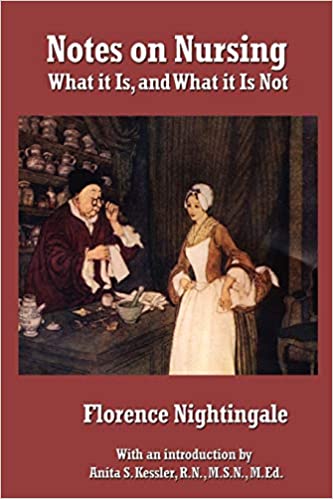
Intro-Why you should read it
Notes on Nursing provides a detailed look at the everyday work habits of nurses and shows what they can do to improve their skills both technically and personally.
Summary-What this book is about
Florence Nightingale’s Notes on Nursing offers insights into nursing with an in-depth look at the profession.
The book covers key concepts of home health, holistic health, and alternative therapies.
Florence Nightingale’s book includes essential training and skills that nurses must have when practicing.
Key Takeaways
- This book explains what nursing is, compares it with other professions, and argues for its importance.
- The author highlights and offers solutions to problems plaguing nursing practice.
How to Survive and Maybe Even Love Your Life as a Nurse by Kelli Dunham and Staci Smith

Intro-Why you should read it
How to Survive and Maybe Even Love Your Life as a Nurse is a survival guide and a self-help book for students in a Nursing School.
Summary-What this book is about
This pocket-sized volume provides nurses at every stage with wisdom and practical advice on everything, including how to maintain healthy relationships.
Key Takeaways
- This book serves as a guide to anyone considering a nursing career path.
- This guide to nursing outlines the joys, pressures, pain points, and sometimes scary moments that nurses face daily.
The Shift: One Nurse, Twelve Hours, Four Patients’ Lives by Theresa Brown
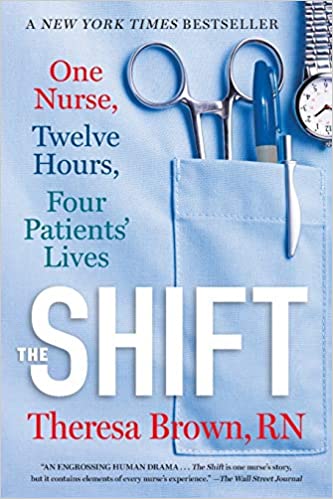
Intro-Why you should read it
The Shift: One Nurse, Twelve Hours, Four Patients’ Lives is the true story of one nurse’s commitment and determination to revive her patients.
Summary-What this book is about
Theresa Brown provides us with a peek inside a typical day of the life of a nurse in an urban teaching hospital.
She explains how much pressure there is on the nurses and what they have to deal with while helping their patients.
Key Takeaways
- Remember that every patient is a person with their own life and problems. Brown is constantly defending this point throughout the book—that she is not just doing her job to collect a check but because she cares about each patient as if they were her own family members.
- Medical professionals must work together to ensure that patients get the best possible care in any situation. Nurses need to build relationships with doctors and other medical practitioners to offer quality services to their patients.
RNotes: Nurse’s Clinical Pocket Guide by Ehren Myers

Intro-Why you should read it
Rnotes: Nurse’s Clinical Pocket Guide by Ehren Myers is small enough to fit in your uniform pocket yet contains valuable information that will help you In your professional development.
Summary-What this book is about
This book covers anatomy and physiology, physical assessment, health promotion and maintenance, pharmacology, and diseases and injuries.
Ehren Myers’ book helps you master the course content with workbook format, summary tables, review questions, and tests.
Key Takeaways
- The best approach for improving patient outcomes is to empower patients by helping them understand how they can play an active role in managing their health.
- Develop a trusting relationship with your patients by reflecting on your attitudes.
First-Year Nurse: Wisdom, Warnings, and What I Wish I’d Known My First 100 Days on the Job by Kaplan Nursing

Intro-Why you should read it
First Year Nurse provides practical advice and wisdom to help nurses in their first months of employment.
Summary-What this book is about
This book covers both the basics and the subtle intricacies of nursing.
The practical tips and insider advice give you the information and valuable insight that will help you get out into the workforce quickly and successfully.
Key Takeaways
- Self-doubt is common among nurses, as well as in other professions. Sometimes it’s just easier to do things yourself instead of getting help from other people, but that can lead to burnout and less-than-optimal patient care. It’s important to reach out and ask for help when you need it.
- The popular culture’s portrayal of Nurses is often inaccurate and potentially harmful to the nursing profession. It reinforces stereotypes about nurses’ role in patient care and can cause patients or family members to undervalue nurses’ expertise and knowledge. By speaking up about how your job really is, you can help change this narrative!
The Immortal Life of Henrietta Lacks by Rebecca Skloot
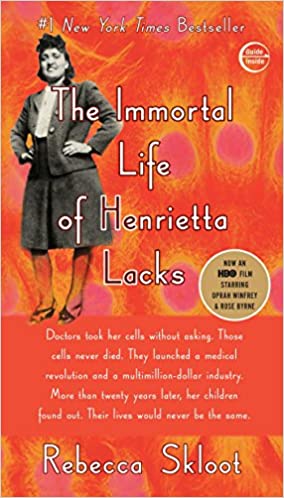
Intro-Why you should read it
An incredible, inspiring, astounding, and informative book about the real-life events of Henrietta Lacks and her immortal cells that are widely used in cancer research today.
Summary-What this book is about
The Immortal Life of Henrietta Lacks is a non-fiction book about medical history and ethics.
Rebecca Skloot examines the impact of medical research on an African-American woman in the 1950s without her knowledge or consent.
The book follows several arcs to pull you in and immerse you in the world of medical science and those involved.
Key Takeaways
- Sometimes you can only truly get closure by forgiving the person who wronged you. Henrietta’s children spent years blaming doctors for their mother’s death and seeking retribution. When they finally met with the doctor they blamed, they found that they could only be at peace once they forgave him.
- If you don’t protect your rights, no one else will either. While Henrietta’s cells were used repeatedly without her consent or knowledge—and without compensation to her family—they never received any royalties for their use or even much recognition that it was their mother who had been so essential to medical science.
Critical Care: A New Nurse Faces Death, Life, and Everything in Between by Theresa Brown
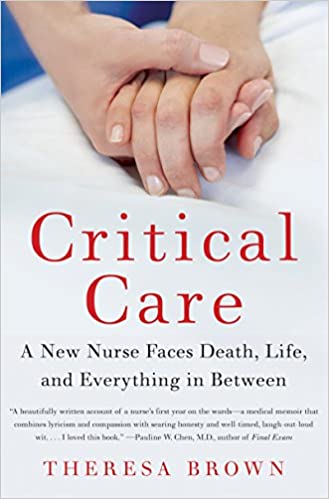
Intro-Why you should read it
This is the perfect healthcare book for new nurses because it offers valuable information from an experienced nurse.
Summary-What this book is about
Critical Care tells the true story of a nurse’s journey to the front lines of inpatient critical care, where she discovers a medical world that is alternately fascinating, frustrating, and dangerous.
Key Takeaways
- This intriguing memoir offers a timely look at health care delivery in America today, highlighting important lessons about improving patient safety and quality of health care for all.
- Nurses are more than just the people who dispense medications and take your vitals. They are human like us. Theresa Brown-a critical care nurse, gives us the inside story of nursing practice.
Bedlam Among the Bedpans: Humor in Nursing by Amy Y. Young

Intro-Why you should read it
You will learn how to laugh, relieve tension, and wield humor as an effective communication strategy in many situations.
Summary-What this book is about
Amy Young’s book offers a unique perspective on how to enhance patient care by keeping a healthy sense of humor.
Key Takeaways
- This book includes a humorous history of the nursing field and a light-hearted guide on how to change your hospital’s culture through humor.
- Doctors, new nurses, and other healthcare workers are regular people, just like everyone else. They have their own sense of humor and their own way of dealing with stress, even as they care for us.
The Language of Kindness: A Nurse’s Story by Christie Watson
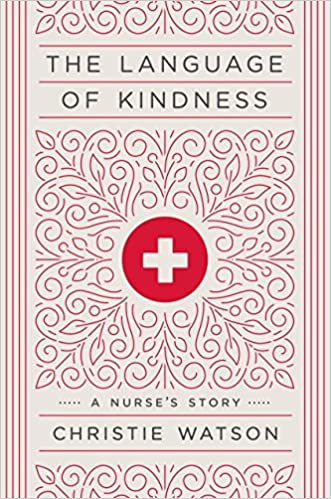
Intro-Why you should read it
Watson’s memoir, The Language of Kindness: A Nurse’s Story, is a testament to the power of compassion in healing.
Summary-What this book is about
This compelling read provides a unique glimpse into the rollercoaster world of a hospital nurse.
In this book, Christie Watson recounts heartbreaking stories from her work in hospitals as well as from her own troubled childhood.
Key Takeaways
- A person’s mood can have a great effect on how they heal. If you make your patients feel good—or at least more comfortable—they will be better able to heal.
- Ask your patients questions about their lives outside of the hospital. This practice will help build a sense of trust between you and them.
Every Patient Tells a Story: Medical Mysteries and the Art of Diagnosis by Lisa Sanders
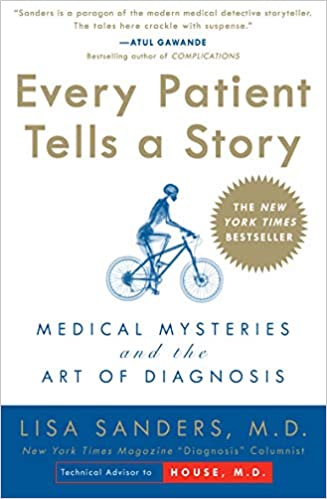
Intro-Why you should read it
Every Patient Tells a Story is an interesting book that narrates the stories of patients.
This book allows beginners and student nurses to grasp many medical concepts through easily understandable prose.
Summary-What is this book about
This Lisa Sanders’ book focuses on the art of making a correct diagnosis, even when all signs point in one direction.
Key Takeaways
- Be humble and have a healthy skepticism about any diagnosis.
- Don’t assume you know what’s wrong with someone. They may be experiencing something you’ve never heard of or seen before. Use your critical thinking skills in everyday life.
- Be willing to learn new things in order to expand your knowledge base and solve more problems.
Ross and Wilson Anatomy and Physiology in Health and Illness by Anne Waugh
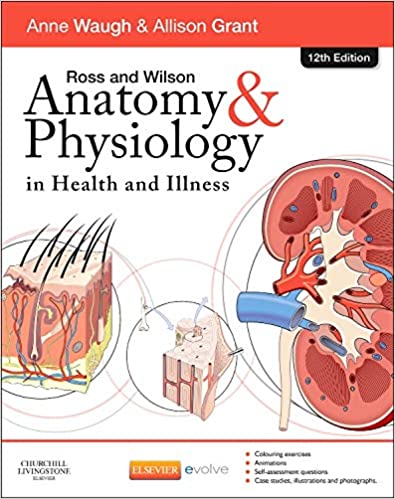
Intro-Why you should read it
This best-selling book by Anne Waugh is a traditional textbook that helps its readers understand the scope of Anatomy and Physiology.
Summary-What this book is about
Anne’s book includes detailed text, tables, and images that give you an accurate scientific understanding of the human body.
The book covers the sciences of gross structure, function, and health through cellular physiology and molecular structure.
Key Takeaways
- Anatomy refers to the study of the body’s structures, while physiology refers to how those structures work together.
- The author presents the information in a learner-friendly style.
I Wasn’t Strong Like This When I Started Out: True Stories of Becoming a Nurse by Lee Gutkind

Intro-Why you should read it
“I Wasn’t Strong Like This When I Started Out” is an exciting, touching, and enlightening book that will remind readers of how special it is to be a nurse.
Summary-What this book is about
Gutkind uses a blend of first-hand observation, historical references, and patient case studies to create a realistic picture of life as an individual who works in caring professions.
His writing is informative and warm, delivering insightful descriptions that an experienced mentor or friend could have easily provided.
Key Takeaways
- Practicing nurses are like superheroes, but the nurse-to-patient ratio means that they don’t always have time to deliver the kind of care they want to be able to give patients.
- Nurses quickly learn that the best sort of patient is a “good” patient who understands and follows doctors’ orders and doesn’t take up too much of the nurses’ time.
- Nursing is a physically and emotionally demanding job, and nurses can suffer injuries if they aren’t careful.
Cooked: An Inner City Nursing Memoir by Carol Karels
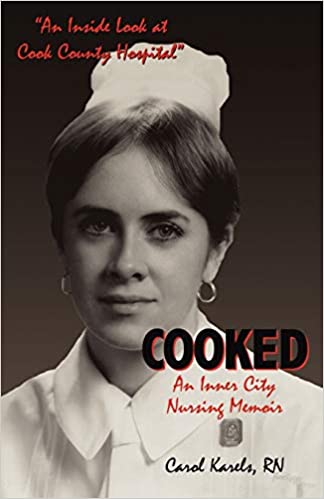
Intro-Why you should read it
Carol Karels captures what it’s like for a young city college student to become a nursing student unexpectedly.
Summary-What this book is about
Cooked is an inspiring story of courage in the face of unexpected challenges, determination to succeed, and compassion in caring for others.
Key Takeaways
- Cooked provides readers with a comprehensive overview of nursing education.
- There is always someone who has it worse than you. Every time Carol feels sorry for herself, she remembers that there is always someone who has it worse than her.
Intensive Care: The Story of a Nurse by Echo Heron
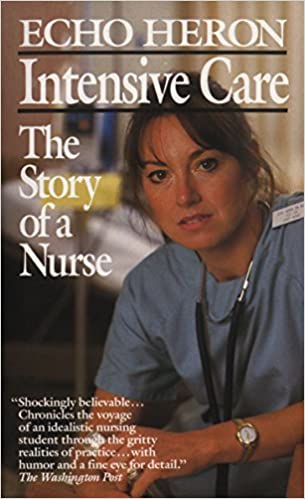
Intro-Why you should read it
This book tells the story of a nurse, highlighting how they work hard to save lives.
Intensive Care: The Story of a Nurse is a page-turning memoir that all medical professionals must have to understand the nursing practice.
Summary-What this book is about
This book tells the behind-the-scenes story of what it takes to become a nurse and treat patients in a healthcare facility.
Key Takeaways
- Intensive Care brings the reader right inside of a hospital setting.
- Even the smallest details matter. All of the little things Echo Heron did for her patients helped them—and helped her.
Too Busy For Your Own Good: Get More Done in Less Time With Even More Energy by Connie Merritt
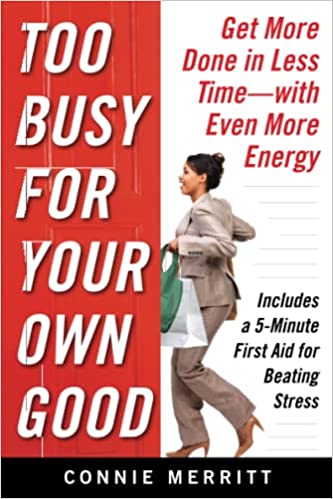
Intro-Why you should read it
Connie Merritt helps you identify which pieces of your daily routine sap you of the energy you need to succeed in the classroom, career, and life.
Summary-What this book is about
Merritt offers you insights, strategies, and tools that make your days more manageable so that you can get the most out of them with even more energy.
Key Takeaways
- This book provides important principles that help us develop an intuitive sense of where to focus and what tasks are worth doing.
- The book gives you a new perspective on how to use time as an ally instead of an enemy.
- Merritt’s entertaining read delivers a delightful combination of many tips, tricks, and techniques.
Conclusion
The nursing program is challenging, and you’ll likely need a little extra help.
Fortunately, there are many of the best books for nursing students to aid you in your studies and career development.
A good nursing book can answer complex questions and encourage you to pursue further education.
We hope our article was helpful.



Hello, I would like to offer you a complimentary copy of “Quirk of Fate”. A story about a day in the life of an ICU nurse. I’m a retired nurse of 40+ years with a couple of decades in ICU. My book is available on amazon.
https://www.amazon.com/Quirk-Fate-James-Sesnak-ebook/dp/B0BGK553SG/ref=tmm_kin_swatch_0?_encoding=UTF8&qid=1683224896&sr=8-1